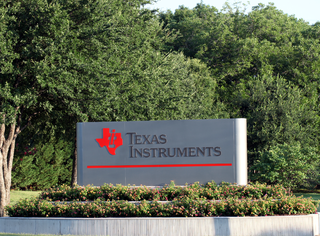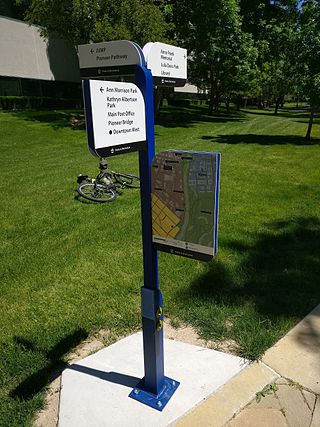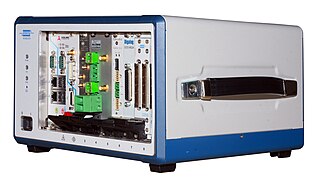
Texas Instruments Incorporated (TI) is an American multinational semiconductor company headquartered in Dallas, Texas. It is one of the top 10 semiconductor companies worldwide based on sales volume. The company's focus is on developing analog chips and embedded processors, which account for more than 80% of its revenue. TI also produces TI digital light processing (DLP) technology and education technology products including calculators, microcontrollers, and multi-core processors.

A prototype is an early sample, model, or release of a product built to test a concept or process. It is a term used in a variety of contexts, including semantics, design, electronics, and software programming. A prototype is generally used to evaluate a new design to enhance precision by system analysts and users. Prototyping serves to provide specifications for a real, working system rather than a theoretical one. Physical prototyping has a long history, and paper prototyping and virtual prototyping now extensively complement it. In some design workflow models, creating a prototype is the step between the formalization and the evaluation of an idea.

The software release life cycle is the process of developing, testing, and distributing a software product. It typically consists of several stages, such as pre-alpha, alpha, beta, and release candidate, before the final version, or "gold", is released to the public.
Software development is the process used to create software. Programming and maintaining the source code is the central step of this process, but it also includes conceiving the project, evaluating its feasibility, analyzing the business requirements, software design, testing, to release. Software engineering, in addition to development, also includes project management, employee management, and other overhead functions. Software development may be sequential, in which each step is complete before the next begins, but iterative development methods where multiple steps can be executed at once and earlier steps can be revisited have also been devised to improve flexibility, efficiency, and scheduling.

Electronic test equipment is used to create signals and capture responses from electronic devices under test (DUTs). In this way, the proper operation of the DUT can be proven or faults in the device can be traced. Use of electronic test equipment is essential to any serious work on electronics systems.
Educational software is a term used for any computer software that is made for an educational purpose. It encompasses different ranges from language learning software to classroom management software to reference software. The purpose of all this software is to make some part of education more effective and efficient.

Laboratory Virtual Instrument Engineering Workbench (LabVIEW) is a system-design platform and development environment for a visual programming language developed by National Instruments.

National Instruments Corporation, doing business as NI, is an American multinational company with international operation. Headquartered in Austin, Texas, it is a producer of automated test equipment and virtual instrumentation software. Common applications include data acquisition, instrument control and machine vision. Since October 2023, NI operates as Emerson Electric's test and measurement business unit after getting acquired.

Windows Installer is a software component and application programming interface (API) of Microsoft Windows used for the installation, maintenance, and removal of software. The installation information, and optionally the files themselves, are packaged in installation packages, loosely relational databases structured as COM Structured Storages and commonly known as "MSI files", from their default filename extensions. The packages with the file extensions mst contain Windows Installer "Transformation Scripts", those with the msm extensions contain "Merge Modules" and the file extension pcp is used for "Patch Creation Properties". Windows Installer contains significant changes from its predecessor, Setup API. New features include a GUI framework and automatic generation of the uninstallation sequence. Windows Installer is positioned as an alternative to stand-alone executable installer frameworks such as older versions of InstallShield and NSIS.

Automatic test equipment or automated test equipment (ATE) is any apparatus that performs tests on a device, known as the device under test (DUT), equipment under test (EUT) or unit under test (UUT), using automation to quickly perform measurements and evaluate the test results. An ATE can be a simple computer-controlled digital multimeter, or a complicated system containing dozens of complex test instruments capable of automatically testing and diagnosing faults in sophisticated electronic packaged parts or on wafer testing, including system on chips and integrated circuits.
Neuros Technology was a Chicago, Illinois–based company that produced a number of audio and video devices under the brand name Neuros. Founded by Joe Born in 2001 as a division of Digital Innovations, it previously operated under the name Neuros Audio. Like Digital Innovations, Neuros distinguished itself by its use of open-innovation and crowdsourcing techniques to bring products to market, as well as by its prominent use of open-source software and open-source hardware. In its development model, end users were involved throughout the product development process from reviewing initial concepts to beta testing initial product releases.

PCI eXtensions for Instrumentation (PXI) is one of several modular electronic instrumentation platforms in current use. These platforms are used as a basis for building electronic test equipment, automation systems, and modular laboratory instruments.
A software factory is a structured collection of related software assets that aids in producing computer software applications or software components according to specific, externally defined end-user requirements through an assembly process. A software factory applies manufacturing techniques and principles to software development to mimic the benefits of traditional manufacturing. Software factories are generally involved with outsourced software creation.
Rocky Mountain BASIC is a dialect of the BASIC programming language created by Hewlett-Packard. It was especially popular for control of automatic test equipment using GPIB. It has several features which are or were unusual in BASIC dialects, such as event-driven operation, extensive external I/O support, complex number support, and matrix manipulation functions. Today, RMB is mainly used in environments where an investment in RMB software, hardware, or expertise already exists.
The Apple Developer Tools are a suite of software tools from Apple to aid in making software dynamic titles for the macOS and iOS platforms. The developer tools were formerly included on macOS install media, but are now exclusively distributed over the Internet. As of macOS 10.12, Xcode is available as a free download from the Mac App Store.

NI Multisim is an electronic schematic capture and simulation program which is part of a suite of circuit design programs, along with NI Ultiboard. Multisim is one of the few circuit design programs to employ the original Berkeley SPICE based software simulation. Multisim was originally created by a company named Electronics Workbench Group, which is now a division of National Instruments. Multisim includes microcontroller simulation, as well as integrated import and export features to the printed circuit board layout software in the suite, NI Ultiboard.
VI Technology was a privately owned company based in Austin, Texas, that provided enterprise test solutions and services. These solutions ranged from benchtop test systems to enterprise-wide test solutions. VI Technology's main product, Arendar, was used by engineering teams in design, characterization, validation, and manufacturing. Working together with key partners, Microsoft and National Instruments, VI Technology had worked with companies from the semiconductor, communications, high-tech electronics, defense, biomedical, and automotive industries. VI Technology original corporate headquarters was located in Austin, Texas, with branch locations in Dallas, Texas, and Mountain View, California.
A test execution engine is a type of software used to test software, hardware or complete systems.

NTi Audio AG is a manufacturer of test and measurement instruments for acoustics, audio and vibration applications. With headquarters in Schaan, Liechtenstein, the company specializes in end-of-line audio testing for manufacturing quality control purposes, provides instruments for testing public address systems in safety-critical environments and also produces handheld Audio Analyzers and generators aimed at the professional audio industry.










